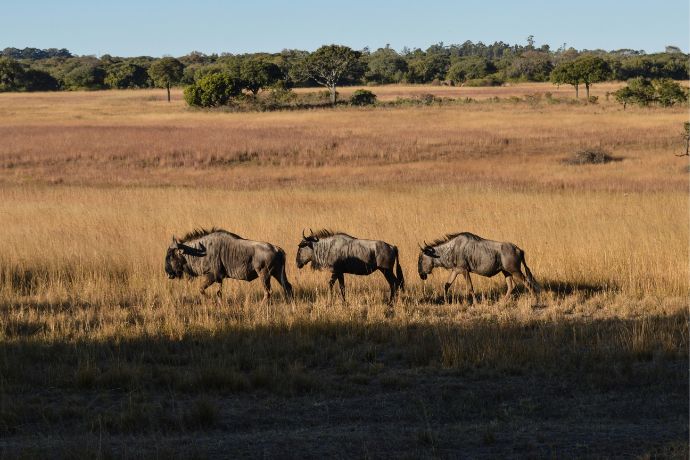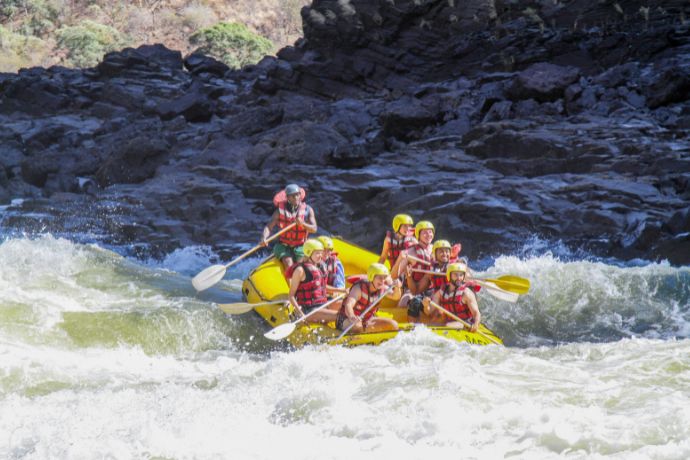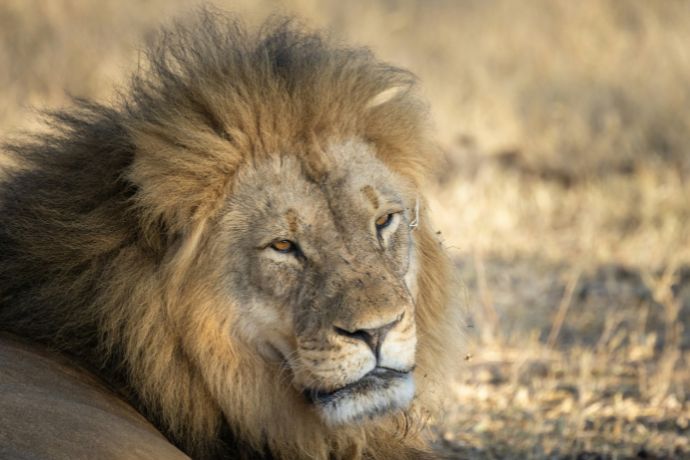- Blog
- International insurance
- Travel Tips for Zimbabwe: Your Essential Guide
Travel Tips for Zimbabwe: Your Essential Guide
Zimbabwe is one of the underexploited treasures in Africa, with breathtaking falls, expansive savannas, pre-colonial ruins and some of the friendliest people on the continent. Victoria falls are magnificent and the wildlife of Hwange National Park is breathtaking, and all these make this landlocked country an experience for any visitor.
Before you pack your bags, though, knowing the right travel tips for Zimbabwe can make all the difference. This comprehensive guide takes you through all this, including the most opportune time to visit, currency usage, safety tips, local practices and safari etiquette, such that you could easily and comfortably venture into Zimbabwe.
 Wildebeest in Hwange National Park, Zimbabwe
Wildebeest in Hwange National Park, Zimbabwe
Best Time to Visit Zimbabwe
Zimbabwe is characterized by two seasons: the dry season (May-October) and the rainy season (November-March). The dry season is normally the most favorable period for making safaris and watching wildlife because the animals are found closer to water sources and the roads are more convenient to use as well.
When you wish to visit Victoria Falls when it is at its highest flow, you should visit during February to May immediately after the rains. But in case of clear skies and perfect game drives, the period between June and September is ideal.
Simply put, this is the best window to be reached by your travel plans, but one of the first vital travel tips for Zimbabwe is knowing the weather of the seasons.
Entry Requirements and Visa Tips
Travelers from most countries will need a visa to enter Zimbabwe, but the process is simple. Depending on your nationality, you can either:
- Obtain a Visa on Arrival, or
- Apply online for an eVisa before traveling.
To apply, make sure that your passport lasts at least six months and that it has two unused pages where the entry stamps are supposed to be. Carry a copy of your ticket for returning home and enough money to stay.
To simplify the process, you may use professional visa assistance platforms (such as Travelner or similar services) to help prepare and submit your application.
Currency and Money Handling
The currency system in Zimbabwe is exclusive. The official currency is the Zimbabwe Gold (ZiG), but the U.S. dollar remains widely used and accepted for tourism and major transactions.
Here are practical money-related travel tips for Zimbabwe:
- Carry small USD bills for daily expenses; high denominations may be hard to break.
- ATMs are available in big cities, but they may charge extra fees or run out of cash.
- Exchange money only at authorized banks or exchange offices — avoid street dealers.
- Many tourist lodges and hotels accept credit cards, but always confirm beforehand.
Typical travel costs:
- Mid-range hotel: $90–170 per night
- Safari tour: $180–350 per day
- Local meal: $6–12
By planning your budget wisely, you can enjoy a high-quality experience without overspending.
Health and Safety Tips
Travel tips for Zimbabwe include your health and well-being. Although Zimbabwe is generally safe for tourists, occasional demonstrations may occur in city centers, so it’s best to avoid large gatherings and follow local news updates.
Vaccinations and Health Precautions
- Recommended vaccines: Typhoid, Hepatitis A/B, Yellow Fever, and Tetanus.
- Malaria is present in many areas, so carry mosquito repellent and consider preventive medication.
- Only drink bottled or boiled water, and avoid ice cubes from uncertain sources.
Travel Insurance
An accident or sickness may occur at any time, particularly when on a safari or on a long journey. That is why Travelner Insurance can be highly recommended to everyone who comes to Zimbabwe. It provides:
- Medical emergency coverage
- 24/7 assistance worldwide
- Protection against flight cancellations, lost luggage, and travel delays
With full insurance coverage, you can think about doing something that you enjoy doing on your trip as opposed to worrying about the possible extra expenses.
 Adventure, rafting, and victoria falls in Victoria Falls, Zimbabwe
Adventure, rafting, and victoria falls in Victoria Falls, Zimbabwe
Transportation Tips
The transportation system in Zimbabwe is diversified and it needs to be planned.
- Domestic flights: These are the safest and quickest means of travelling between Harare, Bulawayo and Victoria Falls.
- Car rentals: The car rentals are very good in the hands of a good driver. Always look at the state of the vehicle and never drive at night because of bad light and crossing bars.
- Public transportation: Buses are inexpensive and usually congested. Minibuses are dangerous things: when you take them, hold close to your chest.
- Taxis and ride-hailing: In major cities, you can use registered taxis or ride-hailing apps like Vaya Zimbabwe or Bolt, where available.
Such tips of transport are some of the best practical tips for travelling in Zimbabwe, particularly for first-time visits.
Accommodation Tips
Zimbabwe offers accommodations for every budget, from luxury lodges to budget guesthouses.
- Victoria Falls: Ideal for first-timers — safe, walkable, and full of hotels overlooking the Zambezi River.
- Harare: Stay in Borrowdale or Avondale for safety and convenience.
- Bulawayo: Offers charming colonial lodges near Matobo Hills National Park.
Always check online reviews; they might have been reviewed and security measures confirmed before booking, particularly when one is traveling alone. Trusted and transparent cancellation policy options are available on booking platforms such as Booking.com or Expedia.
Safari and Wildlife Tips
The national parks of Zimbabwe are a dream destination for wildlife lovers. Going to Hwange, Mana Pools, or Matobo Hills, it is secure and professionally structured; however, make sure to obey the regulations.
Safari Etiquette
- Never leave your vehicle in open areas.
- Follow your guide’s instructions at all times.
- Avoid making loud noises that could scare or provoke animals.
- Keep a respectful distance from elephants, lions, and buffalo.
- Pack binoculars and cameras — but turn off flash settings.
Such rules are not only related to safety but also to the responsible and ethical experience of all participants. For many tourists, safari planning is a major reason they seek Zimbabwe travel advice from experts before visiting.

A lion in Hwange National Park, Zimbabwe
Cultural Etiquette and Local Customs
Zimbabweans are courteous, amiable and respectful. Learning about their traditions improves your experience when traveling.
- Greetings: A handshake and friendly smile go a long way.
- Dress code: Modest clothing is appreciated, especially in rural areas.
- Photography: Always ask for permission before taking photos of locals.
- Tipping: 10–15% is standard in restaurants and for guides.
Knowing some local expressions, such as "Makadii" (hello in Shona) or "Salibonani" (hello in Ndebele), will immediately result in a smile and a grateful face.
Communication and Connectivity
Mobile networks are reliable in cities but limited in rural regions.
- Econet has more coverage than NetOne.
- Purchase a domestic SIM card at the airport that includes data packages to use in navigation and message sending.
- Most hotels and cafés offer Wi-Fi, but internet speed can vary and occasional power cuts may affect connectivity, so consider bringing a power bank.
When you are working remotely or required to have constant connectivity, then you may want to buy a roaming data plan in advance.
What to Pack for Zimbabwe
Packing properly can greatly enhance your comfort and safety.
Essentials
- Lightweight, breathable clothing for daytime
- A light jacket for cooler evenings
- Comfortable walking shoes
- Sunscreen, hat, and insect repellent
- Personal medications and a small first-aid kit
Safari Gear
- Neutral-colored clothes (avoid bright colors that scare wildlife)
- Binoculars and a camera with zoom lens
- Extra memory cards and portable charger
Having good preparation is among the most important travel tips for Zimbabwe; it will assist in adapting to other climates, terrains, and all the travel conditions.
Food and Dining Tips
Zimbabwe’s cuisine blends African and colonial influences. Don’t miss out on trying:
- Sadza: A cornmeal staple served with meat or vegetables.
- Nyama: Grilled or roasted meat, often served outdoors.
- Biltong: Dried beef snack popular among locals.
Stick to reputable restaurants, especially in cities and tourist hubs. Foods sold on the street can be tasty, but one must be careful in consumption and find clean stands with people in line. Always wash hands or use sanitizer before eating.
Budget and Cost-Saving Tips
Zimbabwe offers great value for travelers who plan smartly.
- Book flights and accommodations early to get discounts.
- Join group safaris instead of private tours to save costs.
- Carry refillable water bottles instead of buying plastic ones daily.
- Use USD cash for small purchases to avoid card surcharges.
Another option is Travelner Insurance; the cover includes trip cancellation refunds, which is a clever cover to guard your travel budget.
Responsible and Sustainable Travel Tips
Zimbabwe’s natural beauty is its greatest asset. Respecting and preserving it ensures future generations can enjoy it too.
- Never litter inside parks or reserves.
- Avoid buying souvenirs made from endangered animal parts.
- Support community-based tourism projects that empower locals.
- Conserve water and electricity whenever possible.
These environmentally friendly activities are indicative of the mindful tourism core and these go well in line with the eco-friendly tourism tips for Zimbabwe.
Conclusion
Zimbabwe is a country of marvels—a country of adventure, wildlife and hospitality. By following these essential travel tips for Zimbabwe, you’ll be better prepared to enjoy every moment safely and responsibly.
It is a good thing; whether you are checking out Victoria Falls, lion trails at Hwange, or just the ancient ruins, a small amount of planning and awareness goes a very long way.
And keep in mind: you cannot visit a destination without a good old company like Travelner Insurance getting you covered and keeping you safe against the unknown. Through proper planning, any tourist will be able to claim that he or she has found one of the most fascinating places in Africa.
You need a travel guide to Zimbabwe that is experienced, safe, and authentic, and this is the place to begin; you will never live without remembering this trip.
Explore tailored travel insurance and protect your trip now!
Related articles

Nov 27, 2025
Travel Insurance for Australia: Your Essential Guide

Nov 27, 2025
Cancel Any Reason Travel Insurance Australia: Ultimate Guide for Flexible Travel Protection

Nov 27, 2025
Travel Insurance Australia Family: The Complete Guide for Safer Family Adventures

Nov 27, 2025







